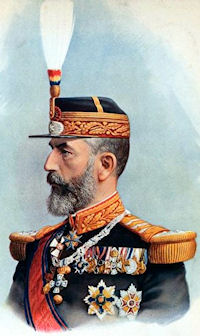King Carol I (1866 - 1914)
 The Count of Flanders, father of the King of the Belgians, was offered the throne but declined it; and Prince Charles of Hohenzollern, a connection of the Prussian Kaiser, was appointed. " Accept it," advised Bismarck, " it will at any rate be an agreeable souvenir for your old age." His election so displeased Austria that, disguised and travelling second class in order to avoid attention-with a small suite of two who travelled first class-and armed with a passport describing him as one Charles Hettinger, he travelled through Austrian territory to his new country. He alighted at Turnu Severin, the frontier of his adopted land, on May 8th, 1866, at the very spot the great Trajan had entered in AD 106.
The Count of Flanders, father of the King of the Belgians, was offered the throne but declined it; and Prince Charles of Hohenzollern, a connection of the Prussian Kaiser, was appointed. " Accept it," advised Bismarck, " it will at any rate be an agreeable souvenir for your old age." His election so displeased Austria that, disguised and travelling second class in order to avoid attention-with a small suite of two who travelled first class-and armed with a passport describing him as one Charles Hettinger, he travelled through Austrian territory to his new country. He alighted at Turnu Severin, the frontier of his adopted land, on May 8th, 1866, at the very spot the great Trajan had entered in AD 106.
The task Prince Charles had undertaken was one of magnitude. The country had been bled white by long centuries of oppression, corruption and immorality in high quarters, misery and subjection in the lower; its finance in an appalling muddle, the army in a deplorable state of administrative disorder. The choice of their ruler, however, proved fortunate, and the Prince showed himself fully capable of attacking the urgent problems that faced him and building up the Roumanian nation.
King Charles, after fostering for forty-eight years the closest political and economical rapprochement with Germany, believed that the interests of Roumania lay there. He felt sure of the victory of the Central Alliance and believed that Roumania would benefit by espousing its cause.
In 1914 King Carol died. His reign, which lasted forty-eight years, was undoubtedly the turning-point in Roumanian history, for the country was transformed from a corrupt and oppressed vassal of the Turks, living in a state of anarchy and chaos, into the first of the Balkan Powers, and the seventh among the independent states of Europe.
|
NEWSLETTER
|
| Join the GlobalSecurity.org mailing list |
|
|
|

